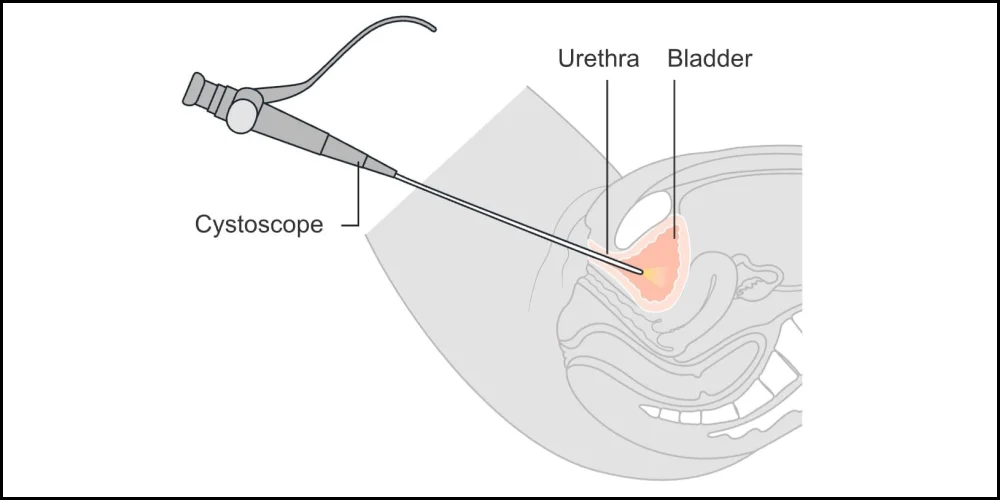Cystoscopy Surgery
Advanced Techniques for Precise Diagnosis and Treatment
The Cystoscopy procedure is minimally-invasive procedure that can be used for both therapeutic and diagnostic reasons in the treatment of bladder issues. This procedure involves the placement of an extremely thin and flexible tube that is fitted with an camera (cystoscope) into the urethra, to see and study the urethra and bladder. The procedure is performed at Chirayu Super Speciality Hospital, we offer the most advanced cystoscopy techniques with a focus on accuracy as well as patient comfort and complete treatment. Our highly skilled urologists use the latest technology to treat and diagnose many bladder problems effectively.

What is Cystoscopy Surgery?
Cystoscopy surgery entails the utilization of a cystoscope, an extremely thin tube equipped with an image camera and a lighting source to see what is inside the bladder, and the urethra. The procedure is carried out via the urethra, without the necessity for external cutting. It is a method to identify conditions like bladder cancer, urinary tract infections and bladder stones, and also to administer certain treatments like bladder biopsy or removal of tumors.
Who Performs Your Surgery?
The cystoscopy procedure is carried out by a team of skilled specialists in urology who specialize in bladder health as well as minimally surgical procedures. Our specialists are proficient in making use of the latest technology in cystoscopy to offer accurate diagnoses and effective treatment options. They collaborate closely with a multidisciplinary group, which includes nurses and radiologists to provide complete assistance throughout your entire treatment.
Types of Cystoscopy Surgery
- Flexible Cystoscopy :- Uses a flexible narrow cystoscope which allows to provide a relaxed and less invasive examination of the bladder as well as the urethra. It is typically utilized for diagnostic reasons and is able to be done as an outpatient procedure.
- Rigid Cystoscopy :- This is a straight, rigid cystoscope, which is usually utilized for more thorough tests or procedures. It is sometimes required to conduct specific procedures or examinations.
- Retrograde Cystoscopy :- A variant of cystoscopy that is performed with a particular focus on medical or diagnostic needs for example, analyzing urinary flow, or finding structural anomalies.
Indications for Cystoscopy Surgery
- Bladder Cancer :- To visualize and biopsy tumors as well as look for the likelihood of recurrence.
- Urecurrent Urinary Tract Infections :- To identify underlying causes and to guide treatment.
- Bladder Stones :- To locate and remove stones that are causing discomfort or obstruction.
- Hematuria (Blood from Urine) :- To determine the cause of bleeding as well as evaluate the condition of the bladder.
- Urinary Tract Abnormalities :- To evaluate structural anomalies or functional problems.
Diagnosis Leading to Cystoscopy
The diagnosis typically begins with an examination of symptoms, medical background, and tests like urine analysis and imaging tests. Cystoscopy will reveal a clear image of the bladder and the urethra. This permits accurate diagnosis and treatment plans.
Treatment Process
Cystoscopy surgery is usually performed as an outpatient under general or local anesthesia, dependent on the complexity of the procedure and the patient’s satisfaction. This procedure entails inserting the catheter into the urethra, allowing you to see the bladder, and then perform any required treatments or biopsies. After the procedure, patients might feel a slight discomfort that tends to disappear quickly.
Care and Recovery After Surgery
The healing process following a cystoscopy procedure is usually quick as most patients are able to return to normal activities in one or two days. After-operative care involves addressing any discomfort, following the specific instructions given by your doctor and attending subsequent appointments to review the results and discuss additional treatments if required.
Advantages of Choosing Our Surgery Services
Advanced Technology
We use the latest cystoscopy equipment to ensure accurate diagnosis and effective treatment with minimal discomfort.
Experienced Specialists
Our urologists are highly skilled in performing cystoscopy with a focus on precision, patient safety, and comprehensive care.
Efficient and Comfortable Care
Our approach emphasizes patient comfort, quick recovery, and efficient treatment to address bladder conditions effectively.
What Our Patients Say
Read about our patients positive experiences and how Chirayu Super Speciality Hospital has positively impacted their health and well-being.


The cystoscopy procedure was comfortable, and the treatment was effective. I’m grateful for the professional care provided by Chirayu.


The care and support provided during my cystoscopy were exceptional. The team’s attention to detail made the experience reassuring.


The cystoscopy helped identify and treat my bladder issue effectively. The results were positive, and the recovery was swift.


The cystoscopy at Chirayu provided an accurate diagnosis and effective treatment. The care I received was exceptional, and I felt well-informed.
Meet Our Medical Specialists
Our skilled urologists specialize in cystoscopy surgery, offering advanced diagnostic and treatment solutions for comprehensive bladder health and care.
Frequently Asked Questions
Here, we provide answers to some of the most commonly asked questions to help you better understand about our surgery services. If you have any additional questions, please do not hesitate to contact us.
Candidates include individuals with symptoms such as blood in urine, recurrent urinary tract infections, or suspected bladder abnormalities.
Benefits include accurate diagnosis, targeted treatment of bladder conditions, and minimal invasiveness with quick recovery.
Cystoscopy surgery involves using a cystoscope to examine the bladder and urethra, allowing for diagnosis and treatment of bladder conditions.
Risks include mild discomfort, potential infection, and, rarely, injury to the urethra or bladder.
Types include flexible cystoscopy, rigid cystoscopy, and retrograde cystoscopy, each used
based on the diagnostic or therapeutic needs.



